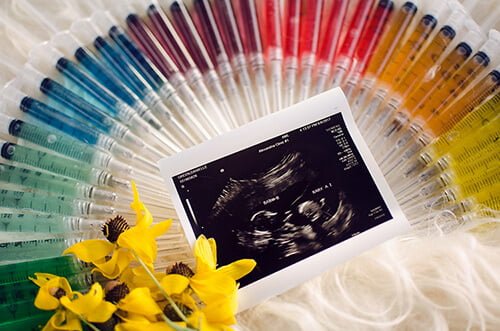Hayat MedTour is a medical tourism facilitator in Iran that has specialized in providing fertility assistance, infertility treatment and IVF in Iran at the best quality and affordable prices
Wednesday, April 27, 2022
HayatMedTour | Fertility Treatment in Iran | IVF in Iran
Thursday, October 8, 2020
increase chances of conceiving by IVF
If you are looking to increase your chances of conceiving during IVF, here are 8 tips from 5 different fertility doctors.
1. Maintain a healthy weight.
"Maintaining a healthy weight is extremely important infertility and IVF," says Linnea Goodman, MD, Assistant Professor of Obstetrics and Gynecology at the UNC School of Medicine. "We know that being obese (BMI >35) and underweight (BMI <19) increases the time of conception by 2 and 4 times respectively, and negatively affects IVF success rates. Being overweight also makes monitoring the ovaries during IVF more difficult and increases the chance of complications during egg retrievals."
This is best implemented with changes in diet and activity with professional help.
"Working with a dietitian, and in some programs enrolling in a cardiometabolic weight loss program can help achieve these goals," says Zaraq Khan, MD, a reproductive endocrinologist at Mayo Clinic in Rochester, MN.
2. Optimize sperm health.
"Use of multivitamins and maintaining optimal body weight, as well using boxers over briefs, could improve sperm quality," says Dr. Khan. "Under appropriate care, men can also be started on medications that can help boost sperm numbers and quality that can have a beneficial impact on IVF outcome. In certain cases, sperm aspirated directly from the testicle over ejaculate could also be beneficial. Involving a male infertility specialist for any form of abnormalities in semen analyses is key."
3. Partner with an excellent doctor and embryology laboratory.
"Choosing an excellent reproductive endocrinologist is twofold: in addition to experience and commitment to evidence-based medicine, look for someone with whom you feel comfortable and connected. Your doctor will accompany you on this very emotional journey and it is important for you to feel supported and heard," says Elizabeth Fino, MD, fertility specialist at NYU Langone Fertility Center. "Asking for recommendations from friends and family who know you best can help guide you to a knowledgeable physician with whom you feel comfortable, but also be sure to do your research."
In a world of online reviews, it can be difficult to determine credibility.
"Be careful of online reviews—they are often completed by select patients who had an extreme experience for one reason or another and may not be universally applicable.
To find an excellent embryology laboratory, look for a long history of exceptional outcomes. One source is the Society for Assisted Reproductive Technology which details the clinic's volume and live birth rate."
4. Reduce your stress.
"Basal stress levels can influence natural and assisted conception rates," says Dr. Khan. "Reducing stress troubles during an IVF stimulation cycle can be one of the hardest things to achieve for couples. Several reports suggest improvement of pregnancy outcomes with the use of acupuncture and other stress-relieving techniques, like enrolling in mind-body programs, stress reduction, and resilience training workshops."
5. Quit smoking
"Smoking can drastically decrease the chance of success while doing IVF because it affects egg and sperm quality," says Dr. Khan.
But you don't have to do it on your own.
"Quitting smoking is not an easy task and often requires a great deal of personal as well as professional support. Try to involve your friends and family to help encourage you in the process. For smoking cessation, structured programs and/or pharmacological assistance have proven to be most successful," says Dr. Fino.
6. Look into taking supplements
"DHEA and CoQ10 are supplements that have shown some promise in association with an increase in egg quantity and quality," says Dr. Fino. "Talk to your doctor to see if he or she recommends them for you."
Multivitamins may also be helpful, adds Dr. Khan.
7. Ensure you have adequate levels of vitamin D
"Over 40% of individuals are deficient in Vitamin D, and there is emerging data on its association with infertility and worse IVF outcomes," says Tarun Jain, MD, medical director of Northwestern Medicine Fertility and Reproductive Medicine Oakbrook Terrace. "Ask your doctor to check your vitamin D level, and consider taking a vitamin D supplement."
8. Focus on persistence and patience.
"Many patients require more than one cycle of IVF to achieve an embryo for transfer and outcomes may vary significantly from cycle to cycle," says Shannon DeVore, MD, at NYU Langone Fertility Center. "If your first cycle wasn't successful, your doctor may be able to adjust the medications to optimize a subsequent one. Other times, it just means keeping at it. Try not to be discouraged by sub-optimal outcomes and setbacks—you are doing everything right. The single biggest thing to remember is that most (or all) of this is out of your control. Nobody likes a lack of control, but sometimes letting go can help you endure the journey. Take care of yourself and don't blame yourself when things don't go well. You are not alone, it often takes a village to build a family."
Saturday, September 5, 2020
IVF Costs in Iran
The average cost of an IVF cycle in the U.S. is $12,400, according to the American Society of Reproductive Medicine. This price will vary depending on where you live, the number of medications you're required to take, the number of IVF cycles you undergo, and the amount your insurance company will pay toward the procedure. You should thoroughly investigate your insurance company's coverage of IVF and ask for a written statement of your benefits. Although some states have enacted laws requiring insurance companies to cover at least some of the costs of infertility treatment, many states haven't.Costs-of-IVF

The cost of IVF in Iran is more affordable than in other countries. Also, in Iran, the infertility treatment services such as IVF have a high quality in the region and in the world. The low-cost of IVF in Iran is due to the low doctors’ wages and inexpensive services in the clinic. The medications cost are the same all over the world. Learn more about IVF cost in Iran: The cost of IVF in Iran
Saturday, August 15, 2020
What Can I Expect From IVF?
The first step in IVF involves injecting hormones so you produce multiple eggs each month instead of only one. You will then be tested to determine whether you're ready for egg retrieval.

Prior to the retrieval procedure, you will be given injections of a medication that ripens the developing eggs and starts the process of ovulation. Timing is important; the eggs must be retrieved just before they emerge from the follicles in the ovaries. If the eggs are taken out too early or too late, they won't develop normally. Your doctor may do blood tests or an ultrasound to be sure the eggs are at the right stage of development before retrieving them. The IVF facility will provide you with special instructions to follow the night before and the day of the procedure. Most women are given pain medication and the choice of being mildly sedated or going under full anesthesia.
During the procedure, your doctor will locate follicles in the ovary with ultrasound and remove the eggs with a hollow needle. The procedure usually takes less than 30 minutes, but may take up to an hour.
Immediately following the retrieval, your eggs will be mixed in the laboratory with your partner's sperm, which he will have donated on the same day.
While you and your partner go home, the fertilized eggs are kept in the clinic under observation to ensure optimal growth. Depending on the clinic, you may even wait up to five days until the embryo reaches a more advanced blastocyst stage.
Once the embryos are ready, you will return to the IVF facility so doctors can transfer one or more into your uterus. This procedure is quicker and easier than the retrieval of the egg. The doctor will insert a flexible tube called a catheter through your vagina and cervix and into your uterus, where the embryos will be deposited. To increase the chances of pregnancy, most IVF experts recommend transferring up to three embryos at a time. However, this means you could have multiple pregnancies, which can increase health. risks for both you and the babies
Following the procedure, you would typically stay in bed for several hours and be discharged four to six hours later. Your doctor will probably perform a pregnancy test on you about two weeks after the embryo transfer.
In cases where the man's sperm count is extremely low or there is poor motility (movement of the sperm), doctors may combine IVF with a procedure called intracytoplasmic sperm injection. In this procedure, sperm is taken from semen -- or in some cases right from the testicles -- and inserted directly into the egg. Once a viable embryo is produced, it is transferred to the uterus using the usual IVF procedure.



